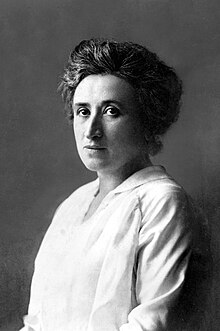Rosa Luxemburg
| Rosa Luxemburg | |
|---|---|
 |
|
| Born | 5 March 1871 Zamość, Congress Poland, Russian Empire |
| Died | 15 January 1919 (aged 47) Berlin, Germany |
| Citizenship | German |
| Alma mater | University of Zurich (Dr. jur., 1897) |
| Occupation |
Philosopher Economist Revolutionary |
| Known for | Luxemburgism |
| Political party |
|
| Spouse(s) | Gustav Lübeck |
| Partner(s) | Leo Jogiches |
| Relatives | Eliasz Luxemburg (father) Line Löwenstein (mother) |
Rosa Luxemburg (also Rozalia Luxenburg; Polish: Róża Luksemburg; 5 March 1871 – 15 January 1919) was a Marxist theorist, philosopher, economist, anti-war activist, and revolutionary socialist of Polish-Jewish descent who became a naturalized German citizen. She was, successively, a member of the Social Democracy of the Kingdom of Poland and Lithuania (SDKPiL), the Social Democratic Party of Germany (SPD), the Independent Social Democratic Party (USPD), and the Communist Party of Germany (KPD).
In 1915, after the SPD supported German involvement in World War I, she and Karl Liebknecht co-founded the anti-war Spartacus League (Spartakusbund), which eventually became the KPD. During the November Revolution she co-founded the newspaper Die Rote Fahne ("The Red Flag"), the central organ of the Spartacist movement.
She considered the Spartacist uprising of January 1919 a blunder, but supported it as events unfolded. Friedrich Ebert's majority Social Democratic government crushed the revolt and the Spartakusbund by sending in the Freikorps (government-sponsored paramilitary groups consisting mostly of World War I veterans). Freikorps troops captured and executed Luxemburg and Liebknecht. Luxemburg's body was thrown in the Landwehr Canal in Berlin.
...
Wikipedia
